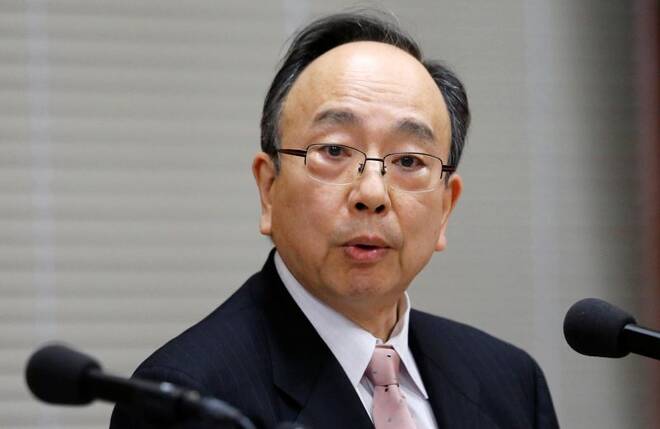Advertisement
Advertisement
BOJ’s deputy governor Amamiya sees no imminent need to tweak YCC
By:
By Leika Kihara TOKYO (Reuters) - Bank of Japan (BOJ) Deputy Governor Masayoshi Amamiya, who is seen as a top contender to become next central bank chief, said on Friday he saw no imminent need to make further tweaks to its yield control policy.
By Leika Kihara
TOKYO (Reuters) – Bank of Japan (BOJ) Deputy Governor Masayoshi Amamiya, who is seen as a top contender to become next central bank chief, said on Friday he saw no imminent need to make further tweaks to its yield control policy.
Speaking in parliament, Amamiya said he was mindful of the demerits of yield curve control (YCC), such as distortions in the yield curve caused by the BOJ’s huge bond buying to defend its 0.5% cap set for the 10-year bond yield.
“YCC is an extraordinary policy, so we must carefully balance the benefits and costs,” Amamiya said.
“For now, I don’t see the need to make further steps to enhance the flexibility of YCC,” he added.
When asked by an opposition lawmaker whether tweaks to YCC could become a future option, Amamiya said: “In general, our basic approach is to guide monetary policy flexibly by weighing the benefits and costs of each step.”
Markets are rife with speculation the BOJ will phase out YCC and raise interest rates under a successor to incumbent governor Haruhiko Kuroda, whose second, five-year term ends in April.
Amamiya is considered by markets as among top contenders to succeed Kuroda, though a government spokesperson denied a report by the Nikkei newspaper on Monday that Prime Minister Fumio Kishida’s administration has sounded him out for the job.
The government will present its nominees for the new BOJ governor and two deputies to parliament on Feb. 14, a ruling party lawmaker told reporters on Friday.
Analysts see Amamiya as being more dovish on monetary policy than other contenders like former deputy governors Hiroshi Nakaso and Hirohide Yamaguchi.
In the parliament session, Amamiya defended the central bank’s ultra-loose policy as having successfully reflated growth, and said it was “premature to debate any specific ideas of an exit policy”. He stressed the need to maintain current stimulus to ensure inflation hits the BOJ’s 2% target in a sustainable manner.
The BOJ’s leadership transition comes at a time Kuroda’s radical stimulus programme is being put to test by creeping inflation – which hit 4% in December – and rising global interest rates.
In a policy proposal last month, the International Monetary Fund (IMF) urged the BOJ to let government bond yields move more flexibly.
Under YCC, the BOJ guides short-term rates at -0.1% and the 10-year yield around 0%. It allows the 10-year yield to move 0.5 basis point up and down each around the 0% target, and also buys risky assets like ETFs as part of its stimulus programme.
(Reporting by Leika Kihara; Editing by Jacqueline Wong & Shri Navaratnam)
About the Author
Reuterscontributor
Reuters, the news and media division of Thomson Reuters, is the world’s largest international multimedia news provider reaching more than one billion people every day. Reuters provides trusted business, financial, national, and international news to professionals via Thomson Reuters desktops, the world's media organizations, and directly to consumers at Reuters.com and via Reuters TV. Learn more about Thomson Reuters products:
Did you find this article useful?
Latest news and analysis
Advertisement
